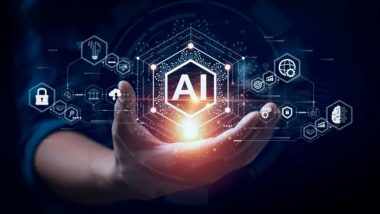Washington, January 15: Artificial intelligence has become more than just a sci-fi concept in movies of the 80s and 90s. Before 2022, AI solutions were available through multiple software and other online options. However, the introduction of ChatGPT by OpenAI changed the game. According to many reports, many tech companies laid off thousands of employees in 2023 due to the adoption of artificial intelligence. Some tech experts and leaders see AI as a potentially beneficial tool that will not replace jobs but help increase productivity but others see it differently.
Amid the ongoing debate on whether AI will replace human jobs, the International Monetary Fund (IMF) shared concerns about the potential impact on the global economy and human jobs. Kristalina Georgieva, the MD of the International Monetary Fund, shared a report mentioning that the effect of AI is difficult to predict. However, it will still "ripple through economies in complex ways". US: eBay to Pay USD 3 Million in Compensation Following Harassment, Stalking Campaign, Sending Bizarre Deliveries Including Live Insects to Couple in Massachusetts.
The report highlighted that IMF staff examined the potential impact of AI on the global labour market and predicted the possibilities of this technology replacing jobs. In its findings, the IMF identified that "40% of global employment is exposed to AI". As per the report, IT and automation affected routine tasks, but now AI will impact high-skilled human jobs. About 60% of jobs will be affected by the technology.
The report said that half of the exposed jobs will benefit from AI integration and increase productivity. AI applications are expected to perform critical tasks for humans, leading to low labour demand, lower wages, and reduced hiring. According to the report, some of these jobs may disappear. Elon Musk Sets New World Record in Diablo 4 AoZ, Shares Live Stream Video of His Gameplay on X.
The report by Kristalina Georgieva, Managing Director at IMF, also highlighted that AI exposure in emerging markets and low-income countries would likely be 40% to 26%, respectively. The emerging markets and developing economies may face few disruptions from AI. However, countries without the infrastructure or required skilled workforce to get the benefits of artificial intelligence are at risk of facing inequality among nations.
(The above story first appeared on LatestLY on Jan 15, 2024 10:23 AM IST. For more news and updates on politics, world, sports, entertainment and lifestyle, log on to our website latestly.com).













 Quickly
Quickly




















